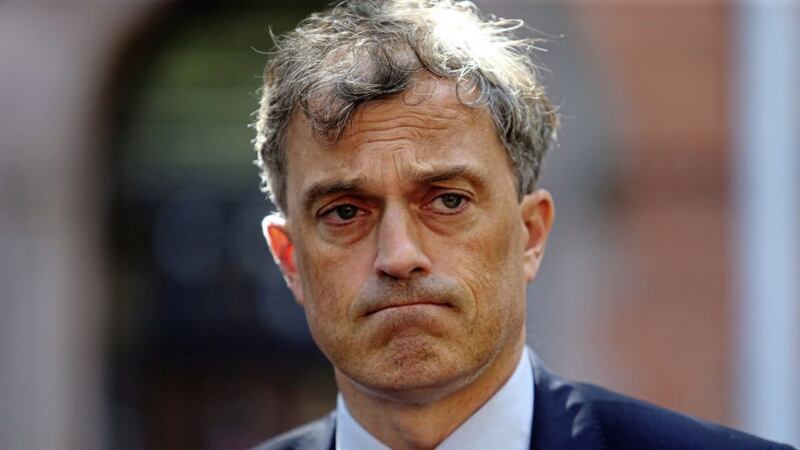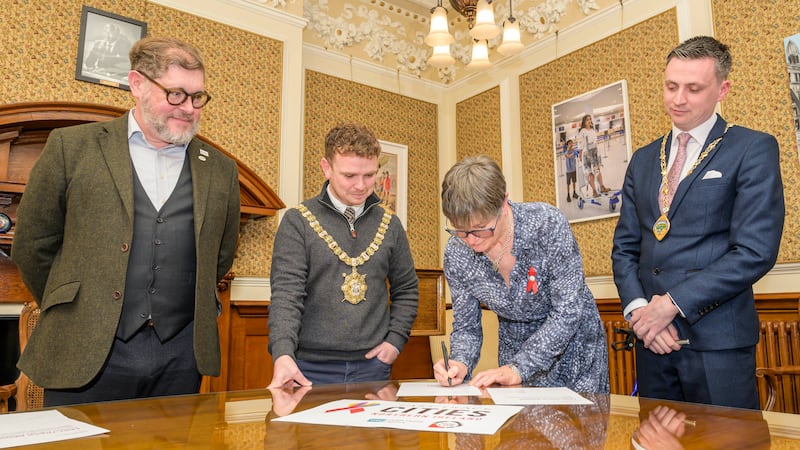Reform of a contentious Stormont voting mechanism could be "helpful" in addressing concerns about handing the DUP a veto over post-Brexit arrangements, the Northern Ireland Secretary has suggested.
Julian Smith said there were "many ways" to achieve the consent of Assembly Members for the proposed all Ireland regulatory system.
The Irish government is among those who have expressed fears that the petition of concern voting mechanism could essentially hand one Northern Ireland party, potentially the DUP, the ability to block the plan, even if a majority of MLAs support it.
Boris Johnson wants to give the currently defunct Northern Ireland Assembly a vote both on whether to opt into the all-island regulatory system in 2021 and whether to remain in it after an initial four-year period.
The petition of concern essentially allows a bloc of Assembly Members from either the nationalist or the unionist community a veto on certain decisions, even if they represent a minority in the chamber.
Mr Smith is currently trying to reignite flagging efforts to restore powersharing in Northern Ireland after almost three years without a devolved legislature.
Ahead of talks with some of the parties on Friday at Hillsborough Castle in Co Down, he was asked whether reforming the petition of concern as part of any deal to resurrect Stormont could help address concerns about the Brexit deal.
"That could be helpful," he said.
"I've always said that I thought consent could be an important part of unlocking this Brexit conundrum."
He added: "I am not going to go into the detail of the negotiation with the EU but the Good Friday Agreement is very clear on consent - it means one party not dominating.
"But I think there are many ways of actually achieving it, and I think we have to really ensure that the parties keep talking and we get them back in the room, that we get them back into Stormont.
"And how that resolves itself in terms of Brexit, I think, will be a matter for the coming weeks for the negotiation team."
Ulster Unionist leader Robin Swann, whose delegation was first to meet Mr Smith on Friday, was heavily critical of Mr Johnson's plan.
He said it segregated Northern Ireland from the rest of the UK and would leave the region in a cycle of never-ending uncertainty, due to the need to vote on membership of the all-island regulatory system every four years.
"We would be left in this perpetual debate where every day in Northern Ireland will be Brexit day, when we are going to be voting on it and deciding on it every four years," he said.
He said there was a need for clarity on how consent would be achieved.
"If it's going to be a referendum, that referendum on that four-year deal then becomes a four-year border poll, and it's continual," he said.
"It's continual uncertainty and insecurity, not just for the people of Northern Ireland but for the businesses that are already here and for people who want to locate businesses here."
Arriving at Hillsborough, Alliance party deputy leader Stephen Farry said he was "deeply concerned" about the impact of the Brexit blueprint on efforts to restore Stormont.
He said the plan had been negotiated in partnership with only one party in Northern Ireland, the DUP.
"That is a serious breach of the duty of the Government to be impartial between everyone," he said.
Mr Farry said the prospect of a Stormont veto on post-Brexit arrangements would complicate efforts to restore the institutions.
"All these proposed vetoes, essentially vetoes for the DUP, will create massive difficulties for the functionality of the institutions," he said.
"In the short run they pose an extra layer of complexity in terms of any restoration of government here.
"We are in an extremely serious situation and the government has made the situation worse over the course of this week."
Read more:
- Leo Varadkar says Republic of Ireland would likely agree to Brexit extension request
- Boris Johnson accepts he must seek Brexit extension if no deal by October 19, court hears
- Boris Johnson in the DUP's pocket, says Peter Hain








